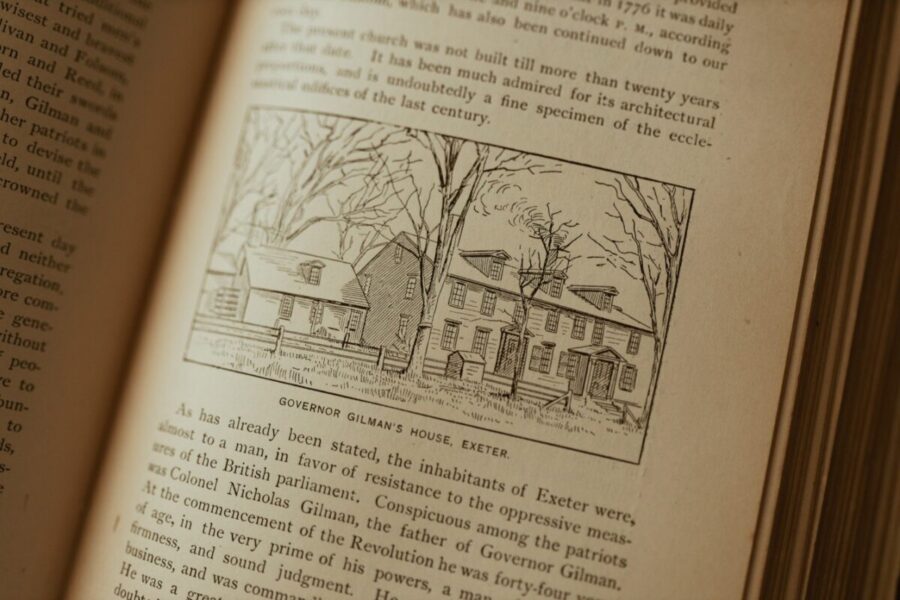Historian Norra Cardillo is researching the Ladd and Gilman women of Exeter, New Hampshire, work she plans to present as part of her master’s portfolio when she graduates from Idaho State University next spring. A descendant of the Ladd and Gilman families, she visited the historic Ladd-Gilman House (1721) at the American Independence Museum (AIM) for the second time in March to continue her research.
According to Cardillo, her research “explores the lived experiences and impact of
women in history.” She said she is especially interested in the ways in which seventeenth-century women defied societal expectations and resisted British authority, parts of history she believes have been predominantly overlooked.
“New Hampshire provincial records from 1684 show that Gilman family women threatened tax collectors under royal British governor Edward Cranfield with violence in order to successfully evade what they deemed unjust taxation,” she said. “Their rebellious action illustrates that women at this time were equal players in the battle for freedom from British colonial rule.”
One of these women, Elizabeth Gilman (Treworgye), was married to statesman John Gilman Sr. “I believe her feminine rebellion against colonial authority would have greatly influenced those around her,” she added.
She said examples like Gilman (Treworgye) have led her to theorize that the people of Exeter had begun to develop a uniquely American identity long before the revolution. Finding primary sources, however, has proved challenging.
“I have seen firsthand that women in history are underrepresented across vast topics,” she said. “This creates issues in the historical narrative because half of the story is missing unless we take steps to amend this critical oversight.”
According to Cardillo, she is taking these steps herself, which includes uncovering colonial women’s motivations, experiences, and stories from historic collections and documents like those at AIM.

Research Material
Her efforts have garnered her attention, as Cardillo recently learned she has been selected to present her research on the early Gilman women at the American Historical Association’s annual conference in New York City in January 2025. Sponsored by the Coordinating Council for Women in History, Cardillo and other selected graduate students will have the opportunity to share their work.
“I am very excited about this opportunity, and it will be my first time attending an academic historical conference,” she said. “I am honored to have such support in helping to highlight women’s history and I am truly thankful for the role AIM has played in encouraging me in my work.”
Jennifer Carr, former executive director of AIM, expressed excitement that Cardillo is able to utilize AIM’s resources to further her research. “Norra’s research is exactly why maintaining spaces of history is so important,” she said, “Women in colonial America were banned from political participation but found ways to make their voices heard. This research shows that there are many ways to participate in civic engagement and can inspire women today to actively engage in democracy.”
In the coming year, Cardillo plans to analyze artifacts, architecture, and primary and secondary source material to learn more about the Ladd and Gilman women. “It is by honoring a woman’s place in history as equal to that of men, that we ensure a more comprehensive understanding of our past in the present day and for future generations,” she stated.
Home to 3,000 historic artifacts, including an original copy of the Dunlap Broadside (Declaration of Independence), AIM develops programs, events, and exhibits that engage people of all ages in the ongoing struggle for freedom and self-governance. AIM is sponsored in part by The Society Of The Cincinnati In The State Of New Hampshire, Service Credit Union, New Hampshire Charitable Foundation, and William W. Treat Foundation.
About American Independence Museum
Located in Exeter, NH, the American Independence Museum features a rare collection of historic artifacts that shed light on the Revolutionary War. Examples of popular items in our exhibits include a dragoon pistol, brown bess musket, and 18th century powder horn. Many of our programs offer insight into civic duties, civic engagement and civic responsibility, while we also feature a variety of things to do in NH, such as camps for kids, festivals, summer festival, reenactments, and homeschool programs. Perfect for a day trip or weekend trips, we believe in inclusivity and inclusive history and the spirit behind the phrase, ‘we the people’.
